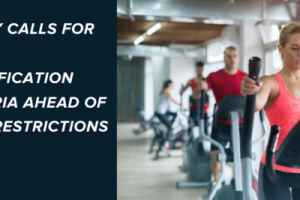Access to health and fitness options vital for mental and physical health.
As COVID-19 cases across Victoria continue to decrease, there are urgent calls for health and fitness facilities including personal training to be reclassified as an essential service ahead of Stage 3 restrictions to help Victorians look after their mental and physical health and wellbeing.
Leading the call is the fitness industry’s peak organisation, Fitness Australia, who has been fiercely advocating for the industry and the vital role gyms, and access to a broad range of professional training options such as personal training, have on the long-term health and wellbeing of the community.
According to Fitness Australia CEO Barrie Elvish, gyms, health clubs, fitness centres and studios such as Yoga, Pilates and Barre should not be classified within the current ‘physical recreational facilities’ category.
Mr Elvish said:
“The classification of health and fitness facilities needs urgent review, we are calling on the Victorian Government to reclassify them as ‘Health and Fitness Centres’ in the Restricted Activity Directions and be allowed to operate in the same way as other essential health services such as Osteopathy, Physiotherapy, Dietetics and Mental Health Services.”
“For many people in our community, especially those managing a range of physical and mental health issues, going to the gym, completing regular sessions with a Personal Trainer or participating in a live or virtual class are seen as an essential support service. Yet under the current classification, the industry is restricted from providing this vital support service.”
Mr Elvish said many other industries were currently permitted to provide a service to their customer, such as fulfilling online orders from a business location, but Personal Trainers cannot do anything.
Mr Elvish said:
“How is it reasonable for businesses to be allowed access to their facilities to pack online orders or for religious groups to live stream content with up to five people, but Personal Trainers or fitness studio’s cannot safely access their business to film or stream workouts or group classes?”
“While the current abnormalities are frustrating and detrimental to our industry and the community, our focus as an industry is on seeking action from the Victorian Government for reclassification ahead of moving to Stage 3 restrictions.
“The focus needs to be on the health and wellbeing of all Victorians and the current Stage 4 and Stage 3 restrictions deem access to health and fitness services non-essential and prohibited.
“Health and fitness centres are low risk when it comes to COVID-19 and the industry is willing to do whatever it takes to provide a safe and hygienic environment for members and employees.”
Mr Elvish said recent data from a random sample of NSW operators proved gyms are safe and not a high-risk place of transmission.
Mr Elvish said:
“Recent Fitness Australia research found there have been more than 6.26 million check-ins across 423 gyms since they reopened in NSW on 13 June. During that same period there had been zero cases of reported community transmission in a gym.”
The Fitness Australia data was validated by electronic swipes, used by all members for access, which also provides for sophisticated contact tracing should it be required.
Mr Elvish said gyms and personal trainers played a very important role in helping people maintain their mental health, strengthen their immune function, and overall wellbeing and called on the Victorian Governments to engage the industry positively rather than label it negatively.
Mr Elvish said:
“Since the beginning of COVID-19, Fitness Australia has been focused on promoting the important role the fitness industry plays in the overall health of our nation. We are not part of the problem; we are actually part of the solution to getting more Australians more active more often and help prevent long-term lifestyle-related disease.”
“By working with Fitness Australia, the Victorian Government can continue to promote the overall health and safety of the community, not just when it comes to protecting them during a pandemic.”



